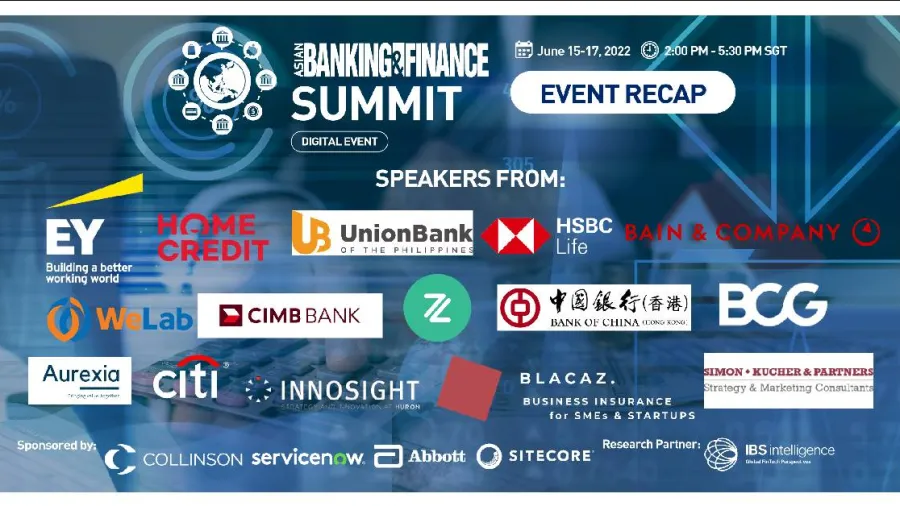
ESG, Sustainability, AI, and NFTs discussed at ABF Summit 2022
Financial service institutions are hurtling towards a new frontier in the financial industry, navigating drastic changes in regulations and customer demand, new sustainability-related risks, and intensifying competition.
And in order to thrive, FSIs must embrace the new, from emerging technologies that enable more personalized customer experiences to collaborating with the disruptors.
These are just some of the key insights that hundreds of attendees learned from the recently concluded Asian Banking & Finance Summit 2022. The three-day event, held from 15-17 June, gathered the region’s top banking executives and market experts to share how to thrive in the current financial space.
DAY 1
Boston Consulting Group’s managing director Tushar Agarwal kicked off the summit with a keynote address exploring the evolving space of cryptocurrency and decentralized finance (DeFi).
Agarwal notes that financial stakeholders—in particular central banks and big financial institutions and even individual investors—have every right to be skeptical of crypto and DeFi due to risks on reputation and monetary risks involved. However, with the right factors, crypto and DeFi presents great opportunities for banks to better service their future consumers—which “literally live in a different world” than banks are familiar with— and even existing consumers, who remained underserved by current services.
It can also help lower costs. “Blockchain technologies have already proven that there are various ways to reduce KYC costs, and also implement a lot of work that happens in the back office to actually reduce significant amount of cost and leading banks are investing significant amount of money, behind the space,” Agarwal said.
CIMB Singapore’s head of commercial banking, Benjamin Tan, followed with a speaking session on sustainability, setting CIMB as an example of how one of the ASEAN’s biggest banks. CIMB has over 33,000 employees and 18 million customers in the region.
“We have launched our GCP or green social sustainable impact products and services framework. Since then we have dispersed over 10 billion ringgit offerings with a target of 30 billion ringgit in sustainable financing by 2030,” Tan shared with the attendees, adding that CIMB is establishing ways to help small and medium-sized businesses become more sustainable.
Collinson’s Daniel Cantora, Vice President, Data, Insights and Technology, Asia Pacific, discussed how financial institutions can establish customer loyalty, calling for FIs to step beyond the historically transactional loyalty tactics—rewards points and discounts—that nowadays is only driving consumer apathy and concerns regarding data security.
“True loyalty is achieved when a customer feels emotionally connected to the brand. And that's largely driven by shared values, or a sense of community,” Cantora noted. “We need to ensure that we are providing a value exchange over time. And this enables us to build rich customer profiles and create in turn better, more relevant experiences.”
Elisha Harrington, Senior Director of Innovation Office, APJ at ServiceNow discussed the sustainable finance transformations of banks, financial companies, and insurance firms and what does it mean for their risk management—and how firms can create business value in this new climate.
“In essence, adhering to an ESG framework means your future proofing your business,” Harrington told attendees. “That’s what we mean about business resilience. And the future of financial services will absolutely revolve around how sustainable finance is rolling out through markets and how you can capitalize from a revenue perspective on these new opportunities.”
Harrington, Agarwal, and Cantona join the first panel discussion with Frederic Tardy, Chief Strategy and Customer Officer for Home Credit, one of the region’s leading buy now pay later (BNPL) providers.
Tardy does not expect the rising interest rates to affect BNPL, but does expect the rise of online shopping to benefit the BNPL market. These are prominent in segments including telcos, mobile devices, and even car manufacturing, he said.
Interest free products will continue, [and even] retailers and manufacturers are also contributing to pay the cost of the interest [in order to] continue offering BNPL products, Tardy added.
Ernst & Young Advisory’s Wolfram Hedrich, Partner, Financial Services Consulting followed with a speaking session on net zero in the financial sector.
“Achieving net zero will require a whole economy transition. And this in turn, could make this the biggest commercial opportunity of our time,” Hedrich said.
He advised banks to leverage their credit departments and engage their front office early on, and ensure that they are getting quality data in order to have the right resources when doing reasonability checks. “Net zero banks will be required to calculate baseline emissions and target setting on a regular annual basis. And so you need to think through the existing infrastructure, and what is needed to support ongoing calculations, reporting and disclosure requirements in the future,” Hedrich concluded.
One topic taking the art and online wold by storm, both in good and bad ways, are NFTs. Cathy Casas, First Vice President, Head of Blockchain and API Business Group, UnionBank, led a speaking session on the risks and opportunities involved in banks exploring the NFT and crypto space.
Casas noted the business opportunity in NFTs and more widely the crypto market, the latter expected to be a US$32b worth market by 2027. Whilst only a nascent sector full of risks, FSIs could leverage its ability to understand all types of risks, update their risk capabilities and assess how they can make use of these new technologies to form new products and new assets for customers, Casas said.
Amdist all this, the threat of the COVID-19 virus continues to hover over the horizon, with any possible resurgence promising negative impacts on banks’ recoveries and future plans. This is why Vinay Dixit, Regional Business Director Abbott, Singapore, discussed the importance of regular testing for banking industry in his speaking session.
Day 1 closed with a timely panel discussion on how FSIs can navigate the new era of consumer banking, moderated by EY Asia-Pacific EPacific Banking and Capital Markets Leader Andrew Gilder. He was joined by Brian Hui, HSBC’s Head of Customer Propositions and Marketing, Wealth and Personal Banking (WPB); Dick Ho, Bank of China Hong Kong’s Deputy General Manager, Personal Banking & Wealth; and Ashmita Acharya, Retail Banking Head, Citi.
DAY 2
The second day focused on banks, beginning with a keynote address by Bain & Company Associate Partner Anders Jensen-Waud, who discussed how banks can seize the banking-as-a-service (BaaS) opportunity in Asia.
Jensen-Waud identified four key factors to consider in launching a BaaS platform: strategy, commercial model, governance, and technology.
First, he said to identify the customers you want to win over and listen, and then determine the right partners that banks want to work with—whether to keep old partners or find a new one; second, how to make a profit; third, ensure that they are compliant with local regulations; and finally, Jensen-Waud told banks to ask whether they are providing a good platform and customer journeys.
Merlyn Tsai, Head of Consumer Banking & Digital of CIMB Singapore, followed with a speaking session on how to break free to break through the traditional lending business.
Tsai said that banks must immolate friction and make their lending processes faster as customers nowadays have a short attention span and would want to access funds as soon as possible. As simple as allowing customers to “save” their half-filled digital application forms can make a difference, according to Tsai. Automation is another important weapon that banks can wield to modernize their lending processes, so long as it is efficient and secure.
Software company Sitecore’s CX and Digital Experience Leader Jacqueline Baxter followed with a discussion urging financial service institutions (FSIs) to move past siloed working in order to adapt to the changing consumer behaviors molded by the self-serve digital landscape.
As digital transformation becomes more critical and a more crucial strategy than ever before, there is greater pressure to collaborate, Baxter said. Failure to work collaboratively is proving a barrier to progress—wasting precious time and resources, she warned.
Baxter joined Jensen-Waud and Jessica Lam, Group Chief Strategy Officer of WeLab in a panel discussion on digital banking, moderated by ABF Editor-In-Chief Tim Charlton.
“The beauty of a digital platform is like it brings everything together: reasonably, seamlessly, and easily,” Lam said, adding that there are two ways to create a successful digital platform: a larger product supermarket, so you have everything in one place.
“But don't just give me a supermarket of 20 products, but actually tell me, or give me advice in terms of which of these 20 products I should be picking,” Lam noted.
Four speaking sessions kicked off the second part of the summit. Silvio Struebi, Partner, Banking Lead APAC, and Revenue & Commercial Strategy Expert for Simon-Kucher & Partners, explored what set apart the digital banks that were able to drive profits versus those that failed to scale the market. Aurexia’s Director for Singapore, Sebastian L. Sohn, followed with a timely overview of the development and regulatory expectations related to ESG for banks in Asia; and Robin Amlot, Managing Editor of IBS Intelligence, followed with a speaking session on the hottest trends revolving in the fintech & banking space in APAC.
The final speaking session for the day was delivered by Innosight Partner Andy Parker. He discussed how financial institutions can navigate disruptions in the financial services industry better.
Parker noted the high growth of new competitors in the banking industry, spearheaded by fintech firms, which continue to attract billions of dollars in venture investing even during the pandemic.
Banks, then, must take the long-term view in order to set up their future, such as launching digital-only banks—which could mean sinking millions if not billions in order to rake in the profits in the future.
Closing the second day is a panel discussion. Simon-Kucher & Partners’ Struebi was joined by Steven Wong Weng Leong, C-suite Banking & Financial Services Executive for China Construction Bank (Malaysia); and Alexander Kling, Director, Financial Services Consulting, Ernst & Young Advisory. Struebi, Wong, and Kling answered questions on wealth management and how they built successful digital bank platforms.


















 Advertise
Advertise







